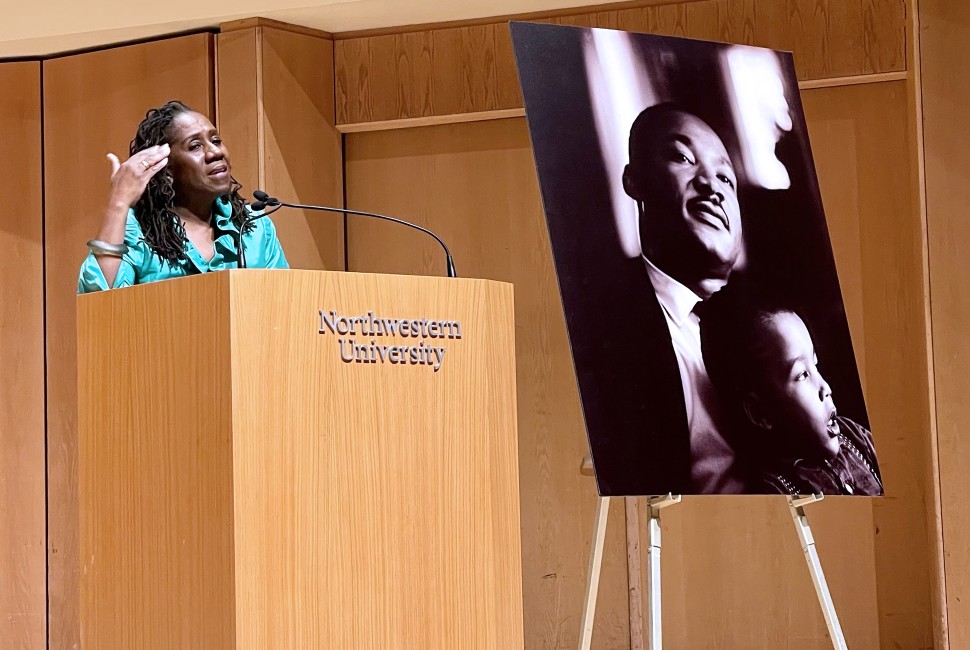Sherrilyn Ifill “doesn’t do ‘the Dream.’”
However, the iconic civil rights lawyer who formerly led the NAACP Legal Defense Fund said the invitation to headline Northwestern’s Dream Week challenged her to reconsider the power of dreaming and the challenges Martin Luther King Jr. was facing when he gave the “I Have a Dream” speech.
Ifill, speaking to the University community on Jan. 23 at Pick-Staiger Concert Hall, said that for too long King’s 1963 speech has been taken out of context and used as a false narrative of color blindness by many who would have resisted his vision had they been in power when King was alive.
The year 1963 was one of the hardest of the movement, Ifill recalled. In April, King was arrested in Birmingham, Alabama, and wrote the famous “Letter from Birmingham Jail,” documenting his disappointment in the failure of white faith leaders to stand with him. In June of that year, civil rights leader Medgar Evers was assassinated on the front stoop of his home in Jackson, Mississippi, while his wife and children were inside. And in September — in direct response to the movement’s demands for the civil rights bill — four young girls were killed in the 16th Street Baptist Church bombing in Birmingham.
King would live to fight five more years, with his opponents’ tactics becoming more extreme and violent, Ifill said. She drew parallels to what activists in the contemporary civil rights movement have seen in response to their progress — whether in the form of voter suppression laws; the “Unite the Right” rally in Charlottesville; the Jan. 6, 2021, attack on the U.S. Capitol; or the upsurge in anti-Black, anti-Asian, anti-Islamic, anti-Latino, and anti-LGBTQ mass shootings across the nation.
“They are reacting to how we have shifted the narrative,” Ifill said. “They are reacting to every statue that has been brought down that represents that which is not true and loving and just. They are responding because tens of millions of people came out in a global pandemic in the largest civil rights protest in history after George Floyd.
“It’s important to understand that we are not powerless. Forces are responding to our power and what they’ve seen us do. They can’t afford to adhere to standards, or rules or ethics. And if we’re not careful, we will misdiagnose them, and we will stop doing things that we are doing right now to follow our vision.”
After concluding her remarks, Ifill joined Sheila Bedi, clinical professor of law and director of the Community Justice and Civil Rights Clinic at Northwestern Pritzker School of Law, for a moderated discussion on topics ranging from police reform to current cases before the Supreme Court. Here are some of Ifill’s responses.
What should public safety look like?
The narrative around abolishing the police has opened up a different conversation. And an appropriate one. Now we have a chance to imagine something different. We have the chance to imagine — what do we think public safety should look like?
Fourteenth Amendment approach to abortion
It’s really astonishing to see the court behaving this way. I also think it’s one of the reasons we need a Fourteenth Amendment approach to talking about abortion. Not just in the context of privacy, but in the context of reproduction as well.
On affirmative action case before the Supreme Court
What the court will have to do to strike down affirmative action is pretty jurisprudentially violent. Not only will they have to overturn precedent because affirmative action came to the court many times and it has upheld race-conscious decisions.
They would have to overcome the Solicitor General testimony that the military is staunchly committed to race-conscious admissions, because they believe it is critical to the integrity of our armed forces to ensure the leadership of our armed forces are as diverse as the rank and file. And that, in times when the leadership has not reflected the rank and file, it has led to low morale, poor communications and so forth.
We are talking about the actual safety of the country, which usually the Supreme Court defers to the military’s judgment about what it means. They have to overcome that.


